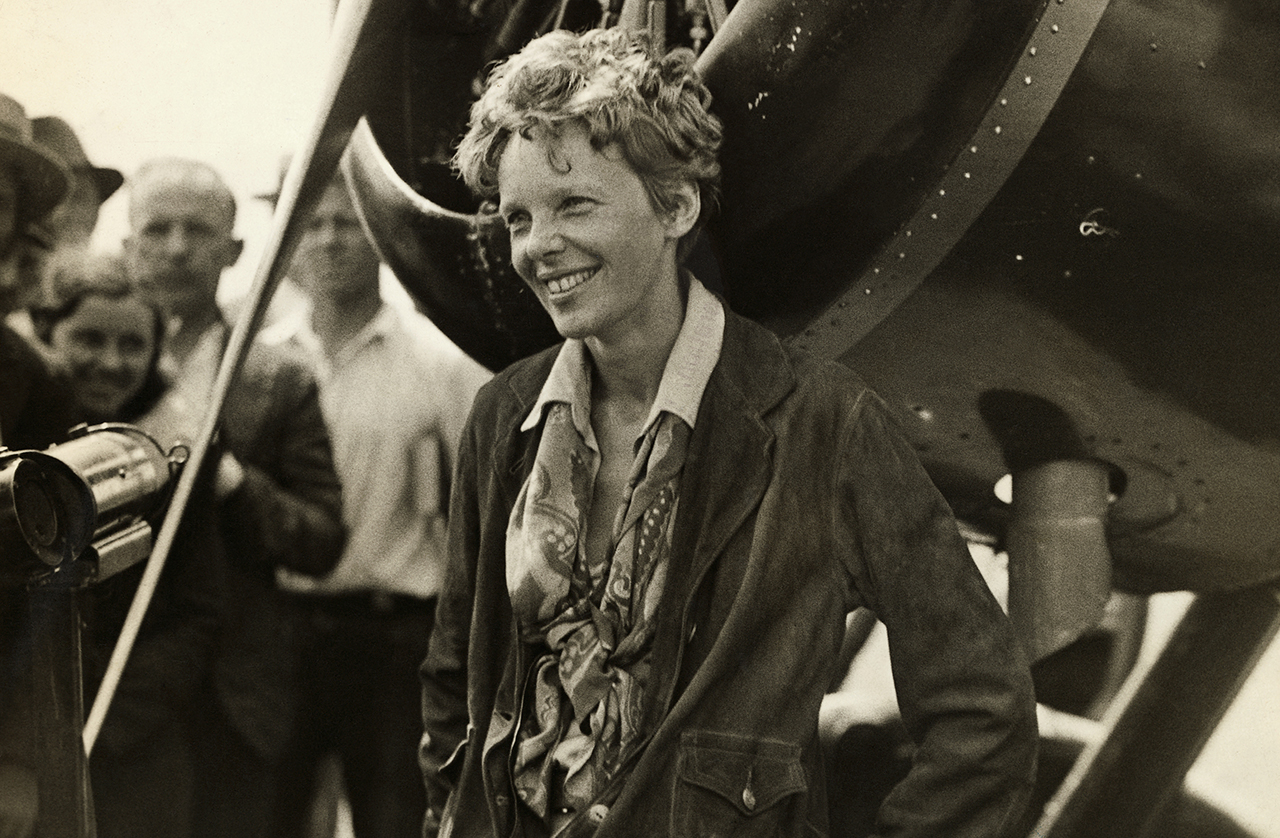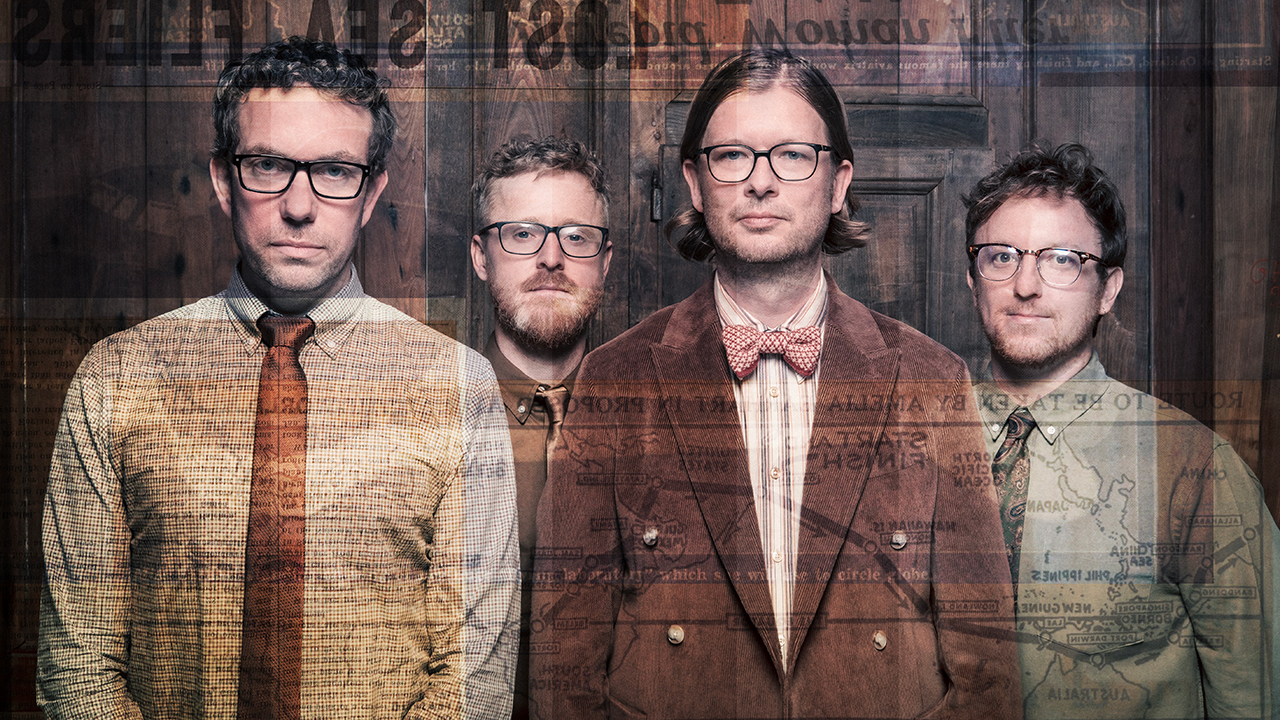Electro conceptualists Public Service Broadcasting have dug through the archives again for their latest album, The Last Flight, which was inspired by the final adventure of pioneering US aviator Amelia Earhart. PSB founder J. Willgoose, Esq. details the dramatic tale of the first person to fly solo across the Atlantic and Pacific Oceans, and the musical journey her feats inspired.
It’s a balmy morning in south-east London at the tail end of summer, and J. Willgoose, Esq. is off duty, judging by his attire. Instead of a spivvy bow tie and blazer, he leads Prog into Public Service Broadcasting’s studio in his civvies. Do fans of PSB only recognise Willgoose when he’s dressed up in a dickie bow and suit jacket? “People don’t recognise me,” he deadpans. “Not an issue.”
The four members of PSB – Willgoose alongside Wrigglesworth and JF Abraham, with Mr B in charge of visuals – may not be household names, but renown has been afforded to this unusual troupe of pop prog musicians masquerading as history boffins… or is it the other way around?
Albums continue to land in the higher reaches of the UK charts; and the BBC recently chose them to celebrate 100 years of the corporation at the Proms, with their full symphony orchestra under the guidance of Grammy award-winning conductor Jules Buckley. Not bad for an operation that started out as a one-man band in a Tooting pub 15 years ago.
That endorsement from the BBC must have felt like a vindication of sorts? “It was a weight of responsibility,” Willgoose says. “And it was a vote of confidence. It was also a recipe for imposter syndrome. That whole experience working with the BBC Symphony Orchestra, with hundreds of thousands of hours of musical expertise, and there’s me struggling to play C major!”
To say Willgoose’s sense of humour is self-deprecating would be akin to saying Lenny Bruce could be a bit blue. It makes an interesting contrast against the band’s music, which carries a sense of uplift, full of escapist adventures of derring-do.
“It’s strange, because I’m not a positive person,” he shrugs. “Maybe it’s there, deep down, and the creative impulse is the way I get it out there. I don’t think anybody who spends any time with me would describe me as a beacon of optimism.”
Part of the optimism in the music comes from revisiting historical events where the future looked brighter than how it turned out – a layer of irony that PSB have become experts in choreographing. “[Astronaut] Gene Cernan’s quote that closes The Race For Space about one day returning to the Moon... well, it’s been 50-odd years and counting.
“It’s that extra layer of knowledge that we’ve accrued in the meantime, looking back on these events. I think that really packs an extra emotional punch on top of just the nuts and bolts of whatever story we’re actually covering at the time.”
That sense of hindsight wouldn’t have been lost on anyone at the Proms. The Reithian principles set out in the 1920s – to inform, educate, entertain – became the name of Public Service Broadcasting’s debut album. But as we all know, the corporation has been under pressure of late with pernicious forces trying to destabilise it.
“And doing a very good job of it,” Willgoose suggests. For the finale of the concert, the players left their instruments one by one until there was an empty stage, with no curtain call or encore; an outcome Willgoose was pleased with on the day given the health and safety concerns. “If you kill the BBC, you get an empty stage,” he warns. “No one else is doing the Proms. Who’s going to do the Proms?”
When PSB first set out, Willgoose coined a pithy mission statement that’s hung around far longer than intended: Teaching the lessons of the past through the music of the future. He groans slightly when it’s brought up. “Oh God, that’s a case of writing something that you thought was wryly amusing, and then it just won’t leave you.
“It was a vain effort to publicise my brief solo run at the Edinburgh Fringe in 2010, to try to stand out from the thousands of other acts. It’s a good line, but it doesn’t stand up to scrutiny. Even the notion that I would put myself in a position to say to somebody, ‘I’m going to teach you about this.’ The arrogance of that is ––”

He cuts himself short before attempting to convey the more nuanced approach that drives the band. “It should say something like, ‘I find these things interesting and emotionally powerful, and I would like to show them to you, and maybe you can get something out of them.’ But it’s not as snappy.”
I remember thinking: ‘Finally, we can have a woman’s voice on this record.’ She spoke in Russian and it was translated in the voice of an Englishman
PSB are nothing if not scrupulous when it comes to the research required for a new album, which Willgoose approaches more like writing a book than making a record. “My background is in English, not in music. Having that background in research and having a kind of ear for a phrase, I think that’s really been helped by doing an arts degree at university and a lot of reading. So every record starts with reading, reading, reading, reading.”
Which brings us to fifth studio album, The Last Flight: a high-octane concept record about the final voyage of Amelia Earhart, who set out in 1937 with the aim of becoming the first woman to circumnavigate the globe. Her aircraft disappeared over the Pacific and neither she nor navigator Fred Noonan were ever found.
What was it about this story that inspired Willgoose? “I wanted a female-focused story one way or another, just to try to redress the balance, really, because a lot of the archives that we’ve got access to are male heavy. Even going back to Valentina Tereshkova from The Race For Space, I remember getting that video of a woman in space and thinking: ‘Here we go – finally, we can have a woman’s voice on this record.’ And then she spoke in Russian and it was translated in the voice of an Englishman. I just couldn’t believe it.”
After trying out several projects that didn’t quite work, Earhart finally won through, thanks to a striking picture of the aviator. “I was reading about her, and then bam! I saw a photo of her and I was mesmerised,” he remembers. “Not from a beauty point of view, but more just how arresting her photo was. Some people have faces like that – when you see a photograph you’re just like, ‘Wow, there’s a lot going on there.’ I really wanted to learn more. It was a real privilege learning more about her. She was a remarkable person.”
In keeping with the band’s usual levity, the album concentrates more on the sense of freedom that flying can engender, rather than honing in too much on the concluding doom, especially on The Fun Of It (featuring Andreya Casablanca from Berlin-based indie duo Gurr), which works as an upbeat pop song even without the context.
How much creativity comes as a result of war… by wanting to kill each other in better ways?
Naturally there’s subtext, too, seen through the familiar prism of hindsight. Electra glides elegantly on a propulsive, irregular beat, a deliberately carefree moment that knows nothing of maker Lockheed’s future war endeavours. “Again, it’s taking these things from the past and bringing them into the present with all the knowledge that we have,” he says.
“You have this gleaming icon of technological hope, like the Electra or the Spitfire, this kind of destructive machine born out of a creative impulse. And how much creativity actually comes as a direct result of conflict and war? How much technological innovation has been driven by wanting to kill each other in better ways? That sense running through it is just really poignant, and it can be darkly ironic and pretty bleak too, actually.”
Less bleak is The South Atlantic, featuring indie-folk outfit This Is The Kit, an airborne moment of gossamer grace and beauty. Naturally, we want to know how working with singer Kate Stables contrasts with working with, say, Blixa Bargeld, pioneer of the inward scream and lead disruptor with Berlin industrial legends Einstürzende Neubauten.
“It’s the most terrified I’ve been in life, working with Bargeld,” he says with tongue in cheek. Der Rhythmus Der Maschinen, from 2021’s Bright Magic, is about as far away from The South Atlantic as one could possibly imagine, a demonstration of the broad church that is PSB.
I certainly didn’t want it to be a maudlin record. I wanted to carry that feeling of adventure
“I went to the Neubauten studio, and I was there with his engineer, who at one point turned to me and said, ‘I am enjoying watching you have a very intense time.’ Thanks, mate! There was a slight crossed wire about the purpose of that song and what we needed.
“But as soon as I actually had the guts to tell Blixa what I needed from him, he was incredible. He rewrote a couple of bits and delivered it in a way that only he can. It’s kind of like the voice of God on that record. It’s extraordinary.”
If The Last Flight is replete with surprising pop moments, the progressive inhabits the remarkable, nine-minute, orchestra-led Howland at the end of the record – which, naturally, addresses the mysterious end of the adventure. “I certainly didn’t want it to be a maudlin record,” asserts Willgoose.
“I wanted to carry that feeling of adventure and to try to sum up the remarkable spirit and courage that she had, while also not getting away from the fact that, clearly, it didn’t end well. But that doesn’t necessarily have to define a life or even that particular journey.”
Unusual for a Public Service Broadcasting record, there are few historical samples, making it more of a reconstruction than a piece culled from the archives, with actor Kate Graham voicing Earhart, and a Senegalese journalist and a Brazilian journalist doing the Pathé-style radio bulletins.
The fastidiousness comes in the way that the actor’s samples are treated and manipulated, and in the details, such as the words pilots might have used before the phonetic alphabet was adopted. The final moment on the record throws up what could be regarded as the only authentic sample.
“It’s taken from Howland Island, which was given to us by the US Pacific Remote Islands and Fisheries Department,” he says. The tiny refuelling stop-off point Earhart and Noonan were searching for when they disappeared, is essentially a sanctuary for seabirds and marine life, and a special-use permit is required to access it.
“I wrote to them and said something like, ‘Does anyone go there? And if they do, could they possibly record some sound? I know you get weird requests, but it’d be great for us.’ And they wrote back after a while and said, ‘Here’s some sounds of wildlife that we recorded there.’ So that last bit of bird call and wind and waves is Howland now.
“I thought it was a nice way of closing the record: we, the listeners, get there many, many, many years later, even if her fate is still – broadly speaking – unknown.”



![Public Service Broadcasting - The Fun Of It [ft. Andreya Casablanca] - YouTube](https://img.youtube.com/vi/6mF9mouDnoc/maxresdefault.jpg)

![Public Service Broadcasting - The South Atlantic [ft. This Is The Kit] - YouTube](https://img.youtube.com/vi/OUh1xKJt8co/maxresdefault.jpg)
